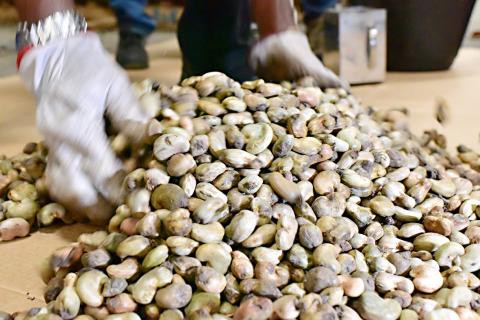Eating certain kinds of tree nuts, such as almonds, pecans, walnuts, hazelnuts and cashews, has been linked to a dramatically lower risk of colon cancer recurrence, researchers said Wednesday.
The observational study involved 826 patients who had undergone treatment for stage III colon cancer, typically including surgery and chemotherapy. Such patients — whose cancer has not spread elsewhere in the body — have a 70 percent chance of surviving three years after treatment.
Some 19 percent of patients consumed two or more ounces of all types of nuts per week.

Photo: AFP
These nut-eaters saw a 42 percent lower chance of cancer recurrence — and a 57 percent lower chance of death than patients who did not eat nuts after completion of their cancer treatment, said the report, released ahead of the American Society for Clinical Oncology (ASCO) annual meeting, held in Chicago next month.
When researchers looked only at tree nut consumption, the chance of recurrence was 46 percent lower and the chance of death was 53 percent lower for those who ate at least two ounces per week, compared to people who did not eat nuts.
Peanuts and peanut butter — the most commonly consumed nuts in the US — did not appear to have any significant effect.
“Numerous studies in the fields of heart disease and diabetes have shown the benefits of nut consumption, and we felt that it was important to determine if these benefits could also apply to colorectal cancer patients,” said lead study author Temidayo Fadelu, a clinical fellow in medicine at Dana Farber Cancer Institute.
“Patients with advanced disease who benefit from chemotherapy frequently ask what else they can do to reduce their chances of recurrence or death, and our study is an important contribution to the idea that modifying diet and physical activity can be beneficial,” Fadelu said.
Eating nuts should not be considered a substitute for standard chemotherapy and other treatments for colon cancer, experts said. “Rather, patients with colon cancer should be optimistic, and they should eat a healthy diet, including tree nuts, which may not only keep them healthier, but may also further decrease the chances of the cancer coming back,” said ASCO president Daniel Hayes.
Researchers cautioned that the study was observational nature and did not prove cause and effect.
A separate study discussed Wednesday ahead of the Chicago cancer conference involved 992 people whose colon cancer had not spread. It showed that following a Mediterranean diet and exercising reduced their risk of dying prematurely by 42 percent and also cut their chances of seeing their colon cancer return.

In the March 9 edition of the Taipei Times a piece by Ninon Godefroy ran with the headine “The quiet, gentle rhythm of Taiwan.” It started with the line “Taiwan is a small, humble place. There is no Eiffel Tower, no pyramids — no singular attraction that draws the world’s attention.” I laughed out loud at that. This was out of no disrespect for the author or the piece, which made some interesting analogies and good points about how both Din Tai Fung’s and Taiwan Semiconductor Manufacturing Co’s (TSMC, 台積電) meticulous attention to detail and quality are not quite up to

April 21 to April 27 Hsieh Er’s (謝娥) political fortunes were rising fast after she got out of jail and joined the Chinese Nationalist Party (KMT) in December 1945. Not only did she hold key positions in various committees, she was elected the only woman on the Taipei City Council and headed to Nanjing in 1946 as the sole Taiwanese female representative to the National Constituent Assembly. With the support of first lady Soong May-ling (宋美齡), she started the Taipei Women’s Association and Taiwan Provincial Women’s Association, where she

It is one of the more remarkable facts of Taiwan history that it was never occupied or claimed by any of the numerous kingdoms of southern China — Han or otherwise — that lay just across the water from it. None of their brilliant ministers ever discovered that Taiwan was a “core interest” of the state whose annexation was “inevitable.” As Paul Kua notes in an excellent monograph laying out how the Portuguese gave Taiwan the name “Formosa,” the first Europeans to express an interest in occupying Taiwan were the Spanish. Tonio Andrade in his seminal work, How Taiwan Became Chinese,

Mongolian influencer Anudari Daarya looks effortlessly glamorous and carefree in her social media posts — but the classically trained pianist’s road to acceptance as a transgender artist has been anything but easy. She is one of a growing number of Mongolian LGBTQ youth challenging stereotypes and fighting for acceptance through media representation in the socially conservative country. LGBTQ Mongolians often hide their identities from their employers and colleagues for fear of discrimination, with a survey by the non-profit LGBT Centre Mongolia showing that only 20 percent of people felt comfortable coming out at work. Daarya, 25, said she has faced discrimination since she